
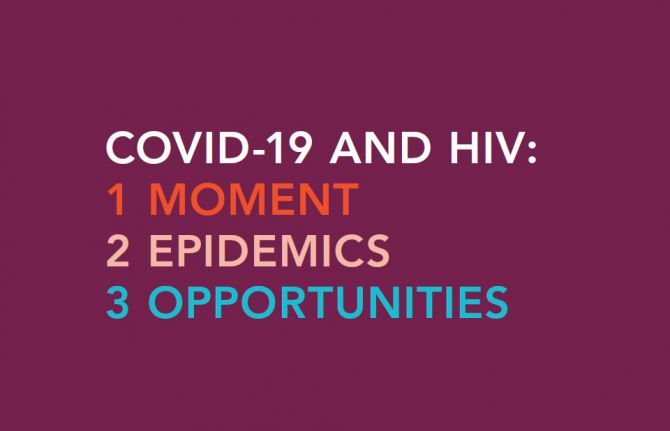
Press Release
HIV and COVID-19: a unique moment in time to learn, leverage and build resilient systems for health
09 September 2020 09 September 2020On the opening day of the Virtual Fast-Track Cities 2020 conference on urban HIV and COVID-19 responses, UNAIDS has released a new report on how to strengthen responses to health emergencies
GENEVA, 9 September 2020—A new report from UNAIDS shows how countries grappling with COVID-19 are using the experience and infrastructure from the AIDS response to ensure a more robust response to both pandemics. COVID-19 and HIV: 1 moment, 2 epidemics, 3 opportunities—how to seize the moment to learn, leverage and build a new way forward for everyone’s health and rights shows that by identifying the dynamic changes needed, systems can be found that are effective, inclusive, equitable and sufficiently resourced.
“Given the epic dimensions of the emergency, the world needs unity and solidarity,” said United Nations Secretary-General António Guterres. “Our decades-long fight against HIV offers essential lessons. By heeding those lessons and working together, we can ensure that national health responses deliver on the promise of the 2030 Agenda for Sustainable Development and the health and well-being of all.”
The three opportunities highlighted in the report are: (1) that key lessons learned from the HIV response should inform COVID-19 responses; (2) how the HIV infrastructure is already driving COVID-19 responses and has the potential to catalyse accelerated progress; and (3) how the COVID-19 and HIV responses offer a historic opportunity to build a bridge to adaptable, results-driven systems for health that work for people.
“This is a unique opportunity to reimagine systems for health,” said Winnie Byanyima, Executive Director of UNAIDS. “All eyes are on health, health systems and health care, with countries wanting to be better equipped to deal not only with COVID-19 but also to create healthier, more resilient societies. We can seize this opportunity by learning from HIV and from COVID-19 to make important changes to develop rights-based, equitable, people-centred systems for health.”
The report highlights how the HIV response can help to jump-start an accelerated response to COVID-19 in ways that can help to ensure that such efforts do not come at the expense of the HIV response or other essential health priorities. At the same time that the world undertakes focused efforts to slow the spread of COVID-19, it must also redouble efforts to limit any interruption and promote rapid recovery of HIV-related services, including ensuring uninterrupted supplies of essential commodities and technologies for HIV and other global health priorities.
“COVID-19 has caused significant loss of life in many communities, but notably in those where inequities make people more vulnerable to ill health. Leveraging of the HIV infrastructure and workforce has helped to mitigate what might have been a far worse situation,” said José M. Zuniga, President/Chief Executive Officer of the International Association of Providers of AIDS Care and co-organizer of the Virtual Fast-Track Cities 2020 event with UNAIDS. “However, with current HIV spending substantially off-track, the world urgently needs to increase investments in the responses to both HIV and COVID-19 and not siphon off one to respond to the other.”
The extensive, dynamic and agile infrastructure that has been built up around the HIV response is being leveraged in many ways to assist the response to COVID-19 and includes innovative, community-led service delivery. For example, 280 000 new health-care workers trained by the United States President’s Emergency Plan for AIDS Relief are currently assisting as first responders to COVID-19 in many low- and middle-income countries. In addition, 17 HIV treatment reference centres in Morocco are now functioning as the first line for COVID-19 treatment services. The HIV nongovernmental organization Housing Works in New York City opened two shelters specifically for homeless people who have tested positive for COVID-19.
The report highlights that although different in many respects, COVID-19 and HIV share important characteristics and that by incorporating key lessons learned from HIV, the response to COVID-19 can avoid many errors. One essential element is the buy-in and leadership of communities. Community activism has sped up the delivery of life-saving HIV medicines, community surveillance has alerted officials to dangerous medicine stock-outs and communities have delivered essential door-to-door HIV testing and treatment services and are leading efforts to strike down punitive laws that drive populations such as gay men and other men who have sex with men, sex workers and people who use drugs away from critical health services.
The report also shows the importance of firmly grounding health responses in human rights and the need for gender-transformative responses. Other actions include strengthening strategic information systems capable of delivering timely, accurate data on the pandemic to identify new outbreaks and global coordination, sustained political will and a multisectoral response.
“The emergence of COVID-19 has exposed the underlying weaknesses in health systems, which have proved to be under-resourced, unprepared and unsustainable,” said Ms Byanyima. “UNAIDS is urging that systems for health be reimagined to ensure that they are inclusive, just and equitable.”
Systems for health in the future must be prepared to address any new major health crisis by being agile, results-driven, inclusive and people-centred. COVID-19 and the response to HIV should be used as an opportunity to reimagine systems for health that work for people, maximize efficiency and effectiveness, attract sufficient resources and engage communities as essential partners for health.
The Virtual Fast-Track Cities 2020 conference is taking place on 9 and 10 September, bringing together around 1500 representatives of more than 300 cities and municipalities around the world to discuss urban responses to COVID-19 and HIV. Anthony Fauci, Director of the United States National Institute of Allergy and Infectious Diseases, will give the keynote speech and UNAIDS will be presenting on the importance of the continuity of HIV services during COVID-19 and discussing mitigation strategies to protect gains made in the response to HIV.
UNAIDS
The Joint United Nations Programme on HIV/AIDS (UNAIDS) leads and inspires the world to achieve its shared vision of zero new HIV infections, zero discrimination and zero AIDS-related deaths. UNAIDS unites the efforts of 11 UN organizations—UNHCR, UNICEF, WFP, UNDP, UNFPA, UNODC, UN Women, ILO, UNESCO, WHO and the World Bank—and works closely with global and national partners towards ending the AIDS epidemic by 2030 as part of the Sustainable Development Goals. Learn more at unaids.org and connect with us on Facebook, Twitter, Instagram and YouTube.
Press centre
Download the printable version (PDF)

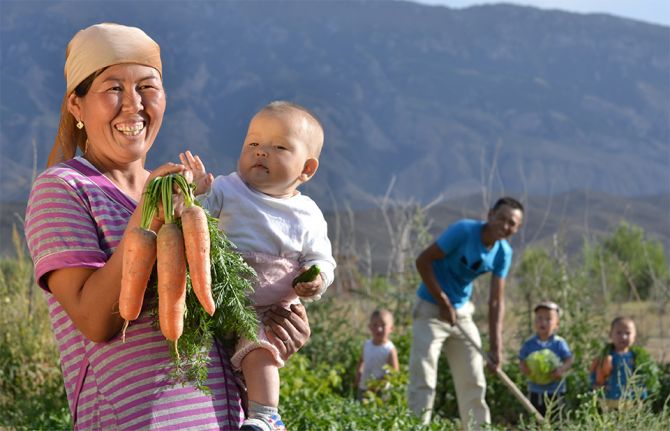
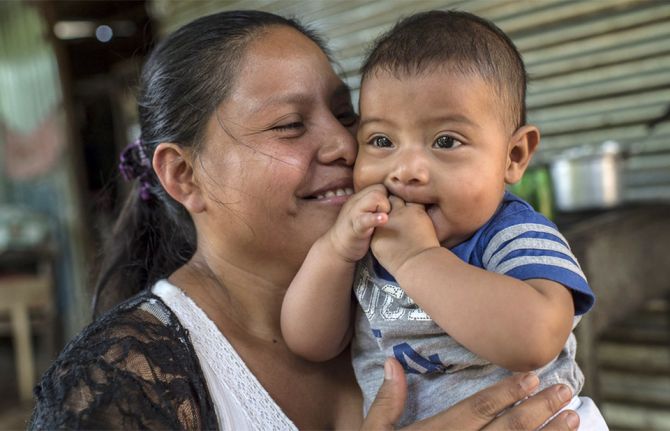
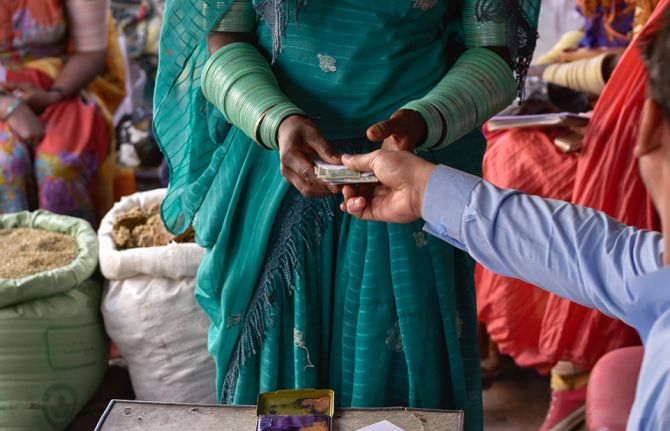
Press Release
UNAIDS calls for urgent action to strengthen social protection programmes in the face of COVID-19
26 August 2020 26 August 2020GENEVA, 26 August 2020—UNAIDS is calling on countries to adopt urgent measures to reinforce social protection programmes to shield the most vulnerable people from the health impact and socio-economic fall-out of the COVID-19 pandemic.
People living with HIV and tuberculosis (TB) are being significantly impacted by COVID-19. Modelling has estimated the potential catastrophic impacts of the COVID-19 pandemic with increases of up to 10%, 20% and 36% projected deaths for HIV, TB and malaria patients, respectively, over the next five years.
Among the most vulnerable are women and girls, gay men and other men who have sex with men, sex workers, people who use drugs and transgender people. Many of them are excluded from existing social protection programmes.
“Countries must ensure that everyone is able to receive essential services including health care and they must invest adequately in social protection programmes to keep people safe and to shield them from the consequences of losing their livelihoods,” said Winnie Byanyima, Executive Director of UNAIDS.
The socio-economic fall-out of the COVID-19 pandemic will have the greatest impact on some of the most disadvantaged people in societies around the world. For example, COVID-19 threatens to double the number of people facing acute food insecurity to more than 265 million by the end of the year. Most of these people will be in countries already badly afflicted by conflict, economic or climate crises. Refugees are among the groups facing the greatest dangers.
Hundreds of millions of people around the world are also in line to lose their jobs in the formal and informal sectors of the economy. Around 150 million full time jobs were lost in the first quarter of the year and millions more people are set to lose their livelihoods in the months ahead.
“Today, only 29% of the world’s population has access to adequate social protection coverage,” said Guy Ryder, Director General of the International Labour Organization.” Governments must act to ensure the sustainability of livelihoods, businesses and jobs and the protection of workers’ health, rights and incomes during and after COVID-19.”
Women are particularly vulnerable to the economic crisis being disproportionately employed in the informal sectors of the economy and therefore most likely to lose their incomes. They are also often employed on the frontline of the response to COVID-19, making up 70% of the workforce in the health and social care sectors, as well as carrying out the bulk of unpaid domestic duties in the home, childcare and other caring functions.
An increase in gender-based violence during lockdown also makes it imperative for governments to invest in social protection programmes designed specifically for the protection of women and girls.
A generation of young people are also at risk from the socio-economic crash caused by the pandemic. The vulnerability of children and young people is being further amplified by school closures which have affected more than 90% of the world’s student population, interrupting their education and their access to crucial social services, such as school meals.
“Children and young people are suffering disproportionately from the socio-economic impact of the COVID-19 crisis,” said Henrietta H. Fore, Executive Director of UNICEF. “Before the outbreak, two out of three children had no or inadequate social protection fund. Countries need to live up to their commitment for social protection for everyone who needs it.”
The call for action for governments to invest adequately in social protection programmes is endorsed by UNAIDS, the United Nations Children’s Fund (UNICEF) and the International Labour Organization (ILO) and supported by the World Food Programme (WFP), the Office of the United Nations High Commissioner for Refugees (UNHCR), the United Nations Entity for Gender Equality and the Empowerment of Women (UN Women), the United Nations Office on Drugs and Crime (UNODC), the United Nations Educational, Scientific and Cultural Organization (UNESCO) and the World Bank.
UNAIDS
The Joint United Nations Programme on HIV/AIDS (UNAIDS) leads and inspires the world to achieve its shared vision of zero new HIV infections, zero discrimination and zero AIDS-related deaths. UNAIDS unites the efforts of 11 UN organizations—UNHCR, UNICEF, WFP, UNDP, UNFPA, UNODC, UN Women, ILO, UNESCO, WHO and the World Bank—and works closely with global and national partners towards ending the AIDS epidemic by 2030 as part of the Sustainable Development Goals. Learn more at unaids.org and connect with us on Facebook, Twitter, Instagram and YouTube.

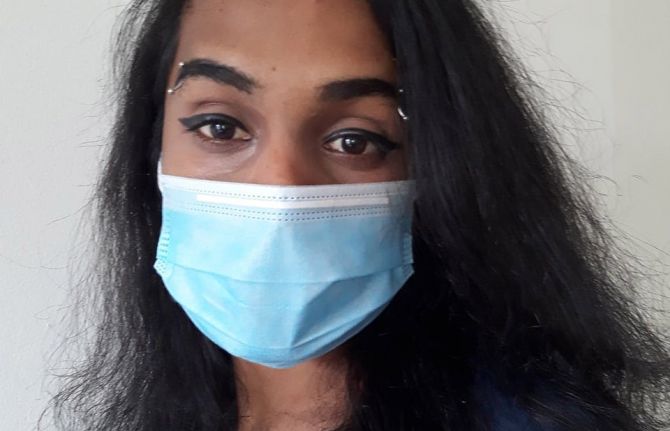
Press Release
Lessons learned from the HIV response – UNAIDS warns of dangers of failing to respect human rights in the response of COVID-19
27 August 2020 27 August 2020Report reveals interruptions of HIV services, violence, harassment, abuse, arrests, deaths and a failure to respect human rights in their early responses to the pandemic—UNAIDS urges governments to protect the most vulnerable, particularly key populations at higher risk of HIV
GENEVA, 27 August 2020—During the early response to COVID-19 UNAIDS received numerous reports of interruptions to HIV services and disturbing human violations against vulnerable and marginalized populations. The experience of the response to HIV has proved that violations of human rights during a pandemic undermine trust, harm individuals, and set back public health responses.
The United Nations Secretary General has requested all United Nations entities to support the efforts of the World Health Organization in their own respective areas of expertise. So, to better inform the response going forwards, UNAIDS commissioned a report on how COVID-19 public health orders and restrictions on movement have impacted the response to HIV and human rights. The findings are reflective of trends across the world and uncovered significant breaches of human rights, life-threatening disruptions to health and social services, violence, abuse and discriminatory targeting of marginalized, poor and key populations.
This report is designed to help governments take positive steps to respond to human rights concerns in the evolving context of COVID-19. “It is a myth that there can be a trade-off between human rights and public health,” said Winnie Byanyima, Executive Director of UNAIDS. “Human rights are not only intrinsic, but they are also the very means by which governments can successfully beat a pandemic.”
Rights in a pandemic – Lockdowns, rights and lessons from HIV in the early response to COVID-19 is a snapshot in time, focusing on the very early days of the pandemic, from February till mid-May 2020, drawing attention to the experiences of some of the most marginalized and vulnerable communities. Violations have included instances of police using rubber bullets, tear gas, and whips to enforce physical distancing, people being arrested and detained for not wearing masks and being issued fines—people who could not pay fines remained in jail longer than those who could pay.
Doctors were arrested and detained for travelling to and from health facilities. Reports were also received of pregnant women dying after strict restrictions on movement prevented them from reaching health-care services—some died while walking to hospital. One report detailed a motorcycle taxi-driver being beaten to death by police after taking a woman in labour to hospital during curfew hours.
Rights in a pandemic outlines 10 immediate areas for action for governments towards building effective, rights-based COVID-19 responses. These include taking proactive measures to ensure that people, particularly people in vulnerable groups, can access HIV treatment and prevention services, designating and supporting essential workers, including community-led organizations, and implementing measures to prevent and address gender-based violence.
"This report is coming at a critical time,” said Felicita Hikuam, Director of the AIDS and Rights Alliance for Southern Africa. “Sadly, it seems that we have not learned the lesson HIV has tried to teach us: epidemics expose and exacerbate existing inequities and impact most negatively on those who are already marginalised.”
A major concern has been safety during lockdowns, particularly for people most affected by HIV including women and girls, children and key populations including sex workers, lesbian, gay, bisexual, transgender and intersex people. In many countries, reported incidents of gender-based violence increased by 40–70%, with even greater spikes in certain cities and regions. Transgender people were harassed and arrested for leaving their home on the “wrong day” under gendered lockdown policies. Sex workers lost incomes and were largely not eligible for financial support. As UNAIDS has repeatedly stated, violence against key populations and women and girls increases vulnerability to HIV.
“The report gives visibility within the framework of this pandemic to those of us who are pushed to the margins,” said Elena Reynaga Executive Secretary of the Network of Women Sex workers of Latina America and the Caribbean. “From a human rights perspective, we need governments to listen and implement these recommendations, which represent an important step towards ending AIDS by 2030 by leaving no one behind."
In May, UNAIDS warned of the risk that access to HIV services may be disrupted during the COVID-19 pandemic. Early modelling showed that a severe disruption in HIV treatment could result in an additional 500 000 AIDS-related deaths in sub-Saharan Africa. This new report shows that HIV prevention and treatment services were disrupted in 10 of the 16 countries reviewed. Some countries reported reductions in medicine collections of up to 20% in some areas. There were multiple reports of people living with HIV not having enough antiretroviral medicine for a lockdown of more than 60 days as well as reports of people having abandoned their HIV treatment due to a lack of food.
In addition to learning lessons from the HIV response, the HIV pandemic must not be forgotten during this crisis. “Communities of people living with and affected by HIV, have again found themselves at the crossroad of injustice and targeted discrimination in the wake of the COVID-19 pandemic,” said Rico Gustav, Executive Director of GNP+. “As a global network of people living with HIV, we call for a rights-based law enforcement that respects and recognises the need of marginalised communities to move freely to access HIV and other medication, as well as the roll out of multi-month dispensing of antiretroviral medicines for HIV.”
There are however many positive examples. In 15 of the 16 countries reviewed, governments released people from prisons to reduce overcrowding and stem COVID-19 transmission. Where governments partnered with civil society and the private sector, responses to COVID-19 were more positive and inclusive. In some countries free transport was provided for emergency medical care during curfews and in others, police handed out masks rather than fines. Some countries provided temporary homeless shelters and supplies of food to people living in camps for displaced people. Others declared that water supplies could not be suspended for non-payment of bills and placed a moratorium on evictions or invested heavily in food support.
“National human rights institutions, such as the one I lead, have a critical role to play in tracking and protecting the human rights of all, both vulnerable and well-to-do, and especially during times of crisis and pandemics such as COVID-19 and HIV,” said Anthony O. Ojukwu, Executive Secretary, National Human Rights Commission of Nigeria. “This report opens to us the opportunity to work with institutions across the world to enforce the checks and balances in place in our own countries to correct excesses such as those of the security personnel during the early days of the lockdown.”
UNAIDS also received reports of countries expanding multi-month dispensing of HIV medicines to 3- or 6-month supplies and of others implementing home deliveries or community-based delivery of medicines.
“UNAIDS acknowledges the positive steps taken. COVID-19 is likely to be with us for a very long time though,” said Ms Byanyima. “We have a commitment to stand up for the most vulnerable even in the tough environment COVID-19 has put us in. We will use this report to convene governments, communities and partners to open a dialogue and to find a way forward to reform bad laws, policies and practices and to protect human rights.”
The report builds on Rights in the time of COVID-19, released by UNAIDS in March 2020, which urged countries to take a human rights approach in responding to COVID-19, in line with best practices from 40 years of responding to HIV.
UNAIDS
The Joint United Nations Programme on HIV/AIDS (UNAIDS) leads and inspires the world to achieve its shared vision of zero new HIV infections, zero discrimination and zero AIDS-related deaths. UNAIDS unites the efforts of 11 UN organizations—UNHCR, UNICEF, WFP, UNDP, UNFPA, UNODC, UN Women, ILO, UNESCO, WHO and the World Bank—and works closely with global and national partners towards ending the AIDS epidemic by 2030 as part of the Sustainable Development Goals. Learn more at unaids.org and connect with us on Facebook, Twitter, Instagram and YouTube.
Contact
UNAIDS GenevaSophie Barton-Knott
tel. +41 79 514 6896
bartonknotts@unaids.org
UNAIDS Media
tel. +41 22 791 4237
communications@unaids.org
Our work
Press centre
Download the printable version (PDF)

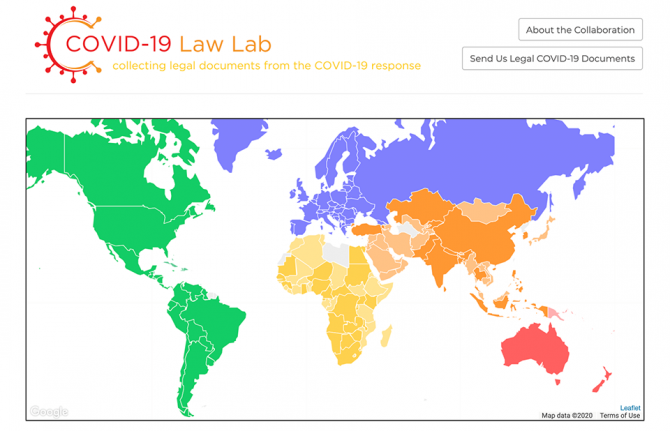
Press Release
New COVID-19 Law Lab to provide vital legal information and support for the global COVID-19 response
22 July 2020 22 July 2020NEW YORK/GENEVA, 22 July 2020—Launching today, the COVID-19 Law Lab initiative gathers and shares legal documents from over 190 countries across the world to help states establish and implement strong legal frameworks to manage the pandemic. The goal is to ensure that laws protect the health and wellbeing of individuals and communities and that they adhere to international human rights standards.
The new Lab (at covidlawlab.org) is a joint project of United Nations Development Programme (UNDP), the World Health Organization (WHO), the Joint United Nations Programme on HIV/AIDS (UNAIDS) and the O’Neill Institute for National and Global Health Law at Georgetown University.
Well-designed laws can help build strong health systems; evaluate and approve safe and effective drugs and vaccines; and enforce actions to create healthier and safer public spaces and workplaces. Critically, they are key to effective implementation of the WHO International Health Regulations: surveillance; infection prevention and control; management of travel and trade; and implementation of measures to maintain essential health services.
“Laws and policies that are grounded in science, evidence and human rights can enable people to access health services, protect themselves from COVID-19 and live free from stigma, discrimination and violence,” says Achim Steiner, UNDP Administrator. “The COVID-19 Law Lab is an important tool for sharing good practices on laws and policies.”
The COVID-19 pandemic has seen a vast increase in urgent legislative action to control and reduce the pandemic.
"Strong legal frameworks are critical for national COVID-19 responses," said Dr. Tedros Adhanom Ghebreyesus, WHO Director-General. “Laws that impact health often fall outside the health sector. As health is global, legal frameworks should be aligned with international commitments to respond to current and emerging public health risks. A strong foundation of law for health is more important now than ever before.”
However, laws that are poorly designed, implemented, or enforced can harm marginalized populations, entrench stigma and discrimination, and hinder efforts to end the pandemic.
“Harmful laws can exacerbate stigma and discrimination, infringe on people's rights and undermine public health responses," according to Winnie Byanyima, Executive Director of UNAIDS. "To ensure responses to the pandemic are effective, humane and sustainable, governments must use the law as a tool to uphold the human rights and dignity of people affected by COVID-19.”
The COVID-19 Law Lab is a database of laws that countries have implemented in response to the pandemic. It includes state of emergency declarations, quarantine measures, disease surveillance, legal measures relating to mask-wearing, social distancing, and access to medication and vaccines. The database will continue to grow as more countries and themes are added.
It will also feature research on different legal frameworks for COVID-19. These analyses will focus on the human rights impacts of public health laws and help countries identify best practices to guide their immediate responses to COVID-19 and socioeconomic recovery efforts once the pandemic is under control. It builds off the work of the UHC Legal Solutions Network, which was established to help countries achieve universal health coverage through the implementation of rights-based legal frameworks.
"We need to track and evaluate how laws and policies are being used during the Pandemic to understand what works," said Dr. Matthew M. Kavanagh, faculty in Georgetown University's Department of International Health. Katie Gottschalk, Executive Director of the O'Neill Institute for National and Global Health Law at Georgetown University Law Center added, "We must learn lessons from the early stage of pandemic policies to implement the most effective laws going forward – the COVID-19 Law Lab allows us to do just that."
UNDP
The United Nations Development Programme is the leading United Nations organization fighting to end the injustice of poverty, inequality, and climate change. Working with our broad network of experts and partners in 170 countries, we help nations to build integrated, lasting solutions for people and planet. Learn more at undp.org or follow @UNDP.
WHO
The World Health Organization provides global leadership in public health within the United Nations system. Founded in 1948, WHO works with 194 Member States, across six regions and from more than 150 offices, to promote health, keep the world safe and serve the vulnerable. Our goal for 2019-2023 is to ensure that a billion more people have universal health coverage, to protect a billion more people from health emergencies, and provide a further billion people with better health and wellbeing. For updates on COVID-19 and public health advice to protect yourself from coronavirus, visit www.who.int and follow WHO on Twitter, Facebook, Instagram, LinkedIn, TikTok, Pinterest, Snapchat, YouTube
UNAIDS
The Joint United Nations Programme on HIV/AIDS (UNAIDS) leads and inspires the world to achieve its shared vision of zero new HIV infections, zero discrimination and zero AIDS-related deaths. UNAIDS unites the efforts of 11 UN organizations—UNHCR, UNICEF, WFP, UNDP, UNFPA, UNODC, UN Women, ILO, UNESCO, WHO and the World Bank—and works closely with global and national partners towards ending the AIDS epidemic by 2030 as part of the Sustainable Development Goals. Learn more at unaids.org and connect with us on Facebook, Twitter, Instagram and YouTube.
O’Neill Institute for National and Global Health Law and Georgetown University
The O’Neill Institute, housed at Georgetown University, was established to create innovative solutions to the most pressing national and international health concerns, with the essential vision that the law has been, and will remain, a fundamental tool for solving critical health problems. The Georgetown University Department of International Health is home to scholarship in public health, economics, political science, and medicine. Georgetown’s Global Health Initiative serves as a university-wide platform for developing concrete solutions to the health challenges facing families and communities throughout the world. Read more at oneillinstitute.org and connect with us on Twitter and Facebook.
UHC Legal Solutions Network
The COVID-19 Law lab is a product of the UHC Legal Solutions Network is a collaboration between the World Health Organization (WHO), the United Nations Development Programme (UNDP), the Joint United Nations Programme on HIV and AIDS (UNAIDS), the Inter-Parliamentary Union (IPU), and the O'Neill Institute for National and Global Health Law at Georgetown University. The initiative aims to support countries to achieve universal health coverage by working with policymakers, civil society groups and other stakeholders to craft laws ensure that all people and communities have the right to access the promotive, preventive, curative, rehabilitative and palliative health services they need, of sufficient quality to be effective, while also ensuring that the use of these services does not expose the user to financial hardship.
Contact
UNDPSangita Khadka
sangita.khadka@undp.org
WHO
Carla Drysdale
cdrysdale@who.int
UNAIDS
Sophie Barton-Knott
bartonknotts@unaids.org
Georgetown University O’Neill Institute
Lauren Dueck
lauren.dueck@georgetown.edu
Our work
Press centre
Download the printable version (PDF)

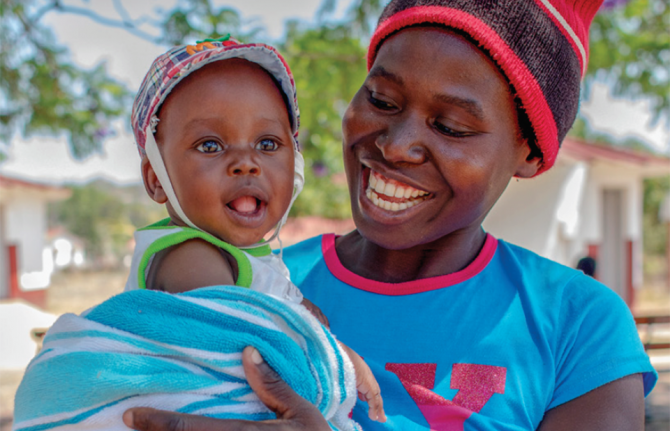
Press Release
Despite great progress since the early days, the HIV response is still failing children
07 July 2020 07 July 2020GENEVA, 7 July 2020—The latest report on the progress towards the Start Free, Stay Free, AIDS Free targets shows that despite great progress made since the early days of the epidemic, the HIV response for children has fallen behind. Year after year, the bold target of eliminating new HIV infections among children is being missed and children are dying needlessly from AIDS-related illnesses—deaths that could be prevented with simple and cheap treatments if the children were diagnosed and treated in time.
“To see so many tools available, so many new HIV infections among children that have been prevented, so many children living with HIV doing well, but to see others missed and still left behind is a tragedy,” said Winnie Byanyima, Executive Director of UNAIDS. “We cannot accept that tens of thousands of children still become infected with HIV and die from AIDS-related illnesses every year.”
The Start Free, Stay Free, AIDS Free framework has three simple concepts. First, babies have a right to enter the world free from HIV. Second, through HIV prevention, children, adolescents and young women have a right to stay free from the virus. Third, children and adolescents who do acquire HIV have the right to be diagnosed, treated and cared for, so that they can remain AIDS-free.
The world’s countries have agreed to a range of HIV prevention and treatment targets. So that children start out their lives HIV-free, one of those targets was to reduce new child (aged 0–14 years) HIV infections to less than 40 000 by 2018 and 20 000 by 2020. However, newly published estimates show that 150 000 children were newly infected with HIV in 2019—a 52% reduction since 2010, but still four times the 2018 target.
By ensuring that pregnant women living with HIV are diagnosed, started on and retained on antiretroviral medicines during pregnancy, delivery and breastfeeding, the chance that they will pass on the virus is less than 1%. Globally, 85% of pregnant women living with HIV received those medicines in 2019. But despite this high coverage, children are still becoming infected due to unequal access to treatment services (primarily in western and central Africa), women falling out of care and pregnant and breastfeeding women becoming newly infected with HIV.
“As a global community, we have made remarkable progress toward controlling the HIV pandemic, yet we are still missing far too many children, adolescents and young women,” said Angeli Achrekar, Principal Deputy United States Global AIDS Coordinator, United States President’s Emergency Plan for AIDS Relief. “We must all redouble our efforts to urgently reach these critical populations—and PEPFAR remains deeply committed to doing its part.”
The stay-free component set a target of reducing new HIV infections among adolescent girls and young women to less than 100 000 by 2020. Adolescent girls and young women have long been disproportionately affected by HIV—among the Start Free, Stay Free, AIDS Free focus countries, adolescent girls and young women make up 10% of the total population but represent 25% of new HIV infections and are at an almost twofold higher risk of HIV infection compared with their male peers. However, new HIV infections among young women have been falling. In South Africa, where combination prevention programmes for adolescent girls and young women are in place, new HIV infections among this age group have dropped by 35%. And in Eswatini, new HIV infections among young women aged 15–24 years have dropped by 54%.
“For too long, the response to HIV has overlooked children, adolescent girls and young women,” said Henrietta Fore, the Executive Director of the United Nations Children’s Fund. “But there is hope. The recent momentum in reducing new infections among adolescent girls and young women in countries like Eswatini and South Africa show us what is possible when governments and communities, led by girls themselves, join forces. We must not let COVID-19 and its economic headwinds slow us down. We must remain bold and ambitious in our joint efforts to ensure that the next generation of children remain free of HIV and AIDS.”
So that children and adolescents stay AIDS-free, countries called for ambitious but achievable targets for HIV treatment for children—to provide 1.4 million children living with HIV with antiretroviral therapy by 2020. In 2019, however, only 950 000 (53%) of the 1.8 million children living with HIV were receiving HIV treatment—much lower than the 67% of adults on treatment. It is clear that to save lives, the missing 840 000 children not on treatment —an estimated two thirds of whom are estimated to be between 5 and 14 years—must be diagnosed and treated as a matter of urgency.
“The lack of optimal HIV medicines with suitable paediatric formulations has been a longstanding barrier to improving health outcomes for children living with HIV, contributing towards low treatment coverage,” said Tedros Adhanom Ghebreyesus, the Director-General of the World Health Organization. “Access to services for vulnerable groups must be expanded through stronger community engagement, improved service delivery and tackling stigma and discrimination.”
Despite the failures, the positive news is that we do know how the world could have met the Start Free, Stay Free, AIDS Free targets. And with enough commitment, we can still overcome the main obstacles to the targets and reverse the failures.
“The past decade has been marked by innovation and progress in the field of paediatric HIV, but the dramatic miss on targets for children in this latest report is simply unacceptable. We must urgently renew our commitment to fighting for an AIDS-free generation, but today, as a global community, we are failing the most vulnerable among us: children and youth,” said Chip Lyons, President and Chief Executive Officer, Elizabeth Glaser Pediatric AIDS Foundation.
“We can do better. We must do better,” added Ms Byanyima. “We know how to save lives and stop new HIV infections among children. I demand that we spare no effort. Anything less is shameful.”
UNAIDS and the United States President’s Emergency Plan for AIDS Relief launched the Start Free, Stay Free, AIDS Free framework in 2016 to build on the achievements of the Global Plan towards the elimination of new HIV infections among children by 2015 and keeping their mothers alive, which ended in 2015.
UNAIDS
The Joint United Nations Programme on HIV/AIDS (UNAIDS) leads and inspires the world to achieve its shared vision of zero new HIV infections, zero discrimination and zero AIDS-related deaths. UNAIDS unites the efforts of 11 UN organizations—UNHCR, UNICEF, WFP, UNDP, UNFPA, UNODC, UN Women, ILO, UNESCO, WHO and the World Bank—and works closely with global and national partners towards ending the AIDS epidemic by 2030 as part of the Sustainable Development Goals. Learn more at unaids.org and connect with us on Facebook, Twitter, Instagram and YouTube.
Contact
UNAIDS GenevaSophie Barton-Knott
tel. +41 79 514 68 96
bartonknotts@unaids.org
UNAIDS Media
tel. +41 22 791 4237
communications@unaids.org
Press centre
Download the printable version (PDF)

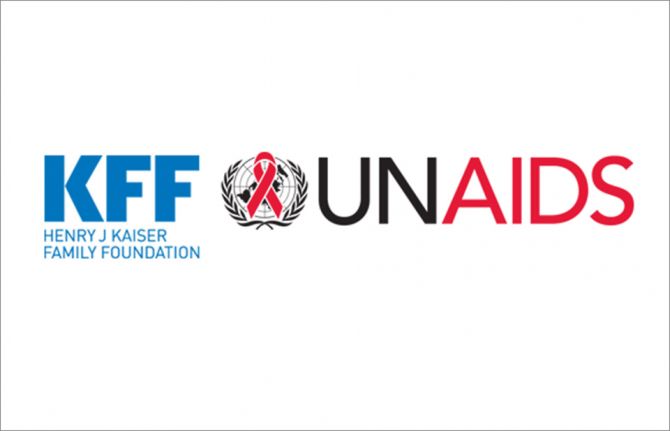
Press Release
KFF/UNAIDS Analysis Finds Donor Governments Spent US$7.8 Billion for HIV in 2019, Down Almost $200 Million From the Previous Year
06 July 2020 06 July 2020Funding from Donor Governments was nearly the same as a Decade Ago, Despite an Increase in the Number of People Living with HIV of 24 percent over that period
GENEVA/SAN FRANCISCO, 6 July 2020—A new report from KFF (Kaiser Family Foundation) and The Joint United Nations Programme on HIV/AIDS (UNAIDS) finds donor government disbursements to combat HIV in low- and middle-income countries totaled US$7.8 billion in 2019, a reduction from the US$8 Billion in 2018 and nearly the same as the funding levels of a decade ago.
Half of the 14 donor governments analyzed in the study decreased their spending on global HIV efforts from 2018 to 2019; six increased; and one held steady. Donor government funding supports HIV care and treatment, prevention and other services in low- and middle-income countries.
The decline in funding was driven primarily by a decrease in bilateral funding from the United States, due to, flat funding from Congress for several years and a shrinking funding pipeline for programs, as well as the timing of disbursements. The decline is also attributable to declining funding from other donors, though to a lesser extent. While donors increased multilateral contributions to The Global Fund to Fight AIDS, Tuberculosis, and Malaria, UNAIDS, and UNITAID by more than $100 million, these gains were not enough to offset declines in bilateral funding. Since 2010, funding from donor governments other than the U.S. has declined by more than US$1 billion largely due to decreased bilateral support for HIV.
Even with its decreased funding, the United States remains the world’s largest donor government to HIV, disbursing US$5.7 billion in 2019, and ranking first in funding relative to the size of its economy. The next largest donor is the United Kingdom (US$646 million), followed by France (US$287 million), the Netherlands (US$213 million) and Germany (US$180 million).
These data feed into the broader UNAIDS global report, which examines all sources of funding for HIV relief, including local governments, non-governmental organizations and the private sector, and compares it the resources need to achieve goals related to testing and treatment. UNAIDS estimates that resources needed by the end of 2020 are US$26.2 billion, compared to US$19.8 billion currently available, leaving a gap of several billion dollars. This gap has grown in recent years as the number of people living with HIV in low and middle income countries has increased by 25% over the past decade and the number of new HIV infections remains high.
“Every dollar not invested today contributes to AIDS-related deaths and new HIV infections,” said Winnie Byanyima, Executive Director of UNAIDS. “In a world characterized by massive inequalities we must ramp up investments for realizing the right to health. It's a shared responsibility, demanding more donor funding and domestic resources, including freeing up fiscal space through debt cancellation.” “Donor governments continue their move away from funding HIV programs in low and middle income countries, while the number of people living with HIV continues to grow,” said KFF Senior Vice President Jen Kates. “This situation is likely to become more precarious in 2020 and beyond, as the effects of COVID-19 hit donor government budgets and take an increasing toll on health and economies around the world.”
The new report, produced as a long-standing partnership between KFF and UNAIDS, provides the latest data available on donor government funding based on data provided by governments. It includes their bilateral assistance to low- and middle-income countries and contributions to the Global Fund, UNAIDS, and UNITAID. “Donor government funding” refers to disbursements, or payments, made by donors.
The Kaiser Family Foundation
KFF is a non-profit organization focusing on national health issues, as well as the U.S. role in global health policy.
UNAIDS
The Joint United Nations Programme on HIV/AIDS (UNAIDS) leads and inspires the world to achieve its shared vision of zero new HIV infections, zero discrimination and zero AIDS-related deaths. UNAIDS unites the efforts of 11 UN organizations—UNHCR, UNICEF, WFP, UNDP, UNFPA, UNODC, UN Women, ILO, UNESCO, WHO and the World Bank—and works closely with global and national partners towards ending the AIDS epidemic by 2030 as part of the Sustainable Development Goals. Learn more at unaids.org and connect with us on Facebook, Twitter, Instagram and YouTube.
Contact
Kaiser Family FoundationNikki Lanshaw
nikkil@kff.org
UNAIDS
Sophie Barton-Knott
tel. +41 79 514 6896/+41 22 791 1697
bartonknotts@unaids.org
Press centre
Download the printable version (PDF)

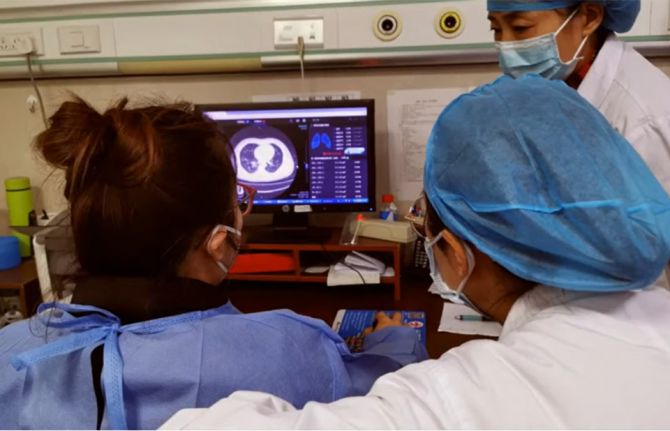
Press Release
UNAIDS Health Innovation Exchange 2020 opens ahead of the International AIDS Conference
01 July 2020 01 July 2020The UNAIDS Health Innovation Exchange’s global event, HIEx2020, will feature health-related innovations from around the world and facilitate discussions around innovation in health
GENEVA, 1 July 2020—The UNAIDS Health Innovation Exchange global event, HIEx2020, has opened, showcasing a virtual marketplace of more than 25 innovations for health from around the world. This year, the event, which is taking place ahead of the 2020 International AIDS Conference, has a special focus on COVID-19.
The innovations presented in the marketplace aim to respond to some of the most critical health challenges faced by countries and communities, particularly in low- and middle-income countries. Innovations range from products to detect counterfeit medicines and illicit substances to digital solutions such as telemedicine platforms that provide remote online medical services, mobile applications to promote the sexual health of young people and COVID-19 diagnostics.
“We need social innovations and to leverage technology to achieve better health outcomes. We need radical game-changers for adolescent girls and young women in sub-Saharan Africa to address persisting inequalities,” said Shannon Hader, Deputy Executive Director, Programme, UNAIDS. “The AIDS response has demonstrated that innovations driven by the passion of communities can transform health-care access and reach the most marginalized.”
One of the featured innovations uses ultraviolet-free LED lighting technology to kill viruses and bacteria, which has recently demonstrated high effectiveness on the new coronavirus that causes COVID-19.
The HIEx2020 programme will run over two days (1 and 2 July) and will feature key leaders in health and innovation. The programme of high-level events includes Lessons from COVID-19: Innovating to Future-Proof our Health Systems, Young People’s Access to Digital Health and Changing Healthcare through Innovations.
Mariya Gabriel, the European Commissioner for Innovation, Research, Culture, Education and Youth, will deliver a keynote address focused on leveraging innovation and leadership for global health. “Innovation must be part of the health-care DNA, leaving no one behind,” said Ms Gabriel. “But no individual continent, country or institution can win this race on its own. It takes a global effort and political commitment.”
HIEx2020 will feature a special spotlight on solar energy for health through a high-level discussion with ministers of health and energy from several countries, which is organized in collaboration with the International Solar Alliance. Primary health facilities in several countries lack reliable power, which not only limits quality of services but also prevents the take-up of digital health tools for scaling up access to health care.
“Solar energy can ensure better availability and quality of health services in areas where there is a challenge of access to energy,” said Upendra Tripathy, the Director-General of the International Solar Alliance. “We should work towards scaling up solar energy as an agent for transforming primary health care in developing countries.”
Innovations for COVID-19
The COVID-19 pandemic has brought to light the crucial importance of ensuring that health systems are resilient and that countries have the necessary technologies and capacities to respond effectively to health crises.
The UNAIDS Health Innovation Exchange has been an early supporter of tracking COVID-19-related innovations. As the COVID-19 pandemic was rapidly spreading in March 2020, UNAIDS and the UNAIDS Health Innovation Exchange teamed up with StartupBlink to launch a dynamic online map of COVID-19-related innovations. The map now has more than 30 000 monthly users and includes details of more than 1000 initiatives from around the world. As part of HIEx2020, the UNAIDS Health Innovation Exchange and StartupBlink will launch an in-depth analysis of the COVID-19 initiatives in an Innovation Ecosystem Report, which will measure and rank cities and countries globally in terms of innovation for COVID-19.
To visit HIEx2020 go to: https://event.healthinnovation.exchange/
UNAIDS Health Innovation Exchange
Launched by UNAIDS in Geneva, Switzerland, in May 2019, the UNAIDS Health Innovation Exchange identifies challenges faced by implementers and connects them with innovations that have high potential for impact, and links with investors to scale up the sustainable solutions. The UNAIDS Health Innovation Exchange builds upon the expertise of political leaders, health experts, technology and science leaders, innovators, investors, accelerators, communities and implementers in countries, and advocates for indigenous solutions, local production and multisectoral partnerships.
Note: inclusion in the UNAIDS Health Innovation Exchange marketplace does not equal endorsement of the innovation by UNAIDS or the UNAIDS Health Innovation Exchange.
UNAIDS
The Joint United Nations Programme on HIV/AIDS (UNAIDS) leads and inspires the world to achieve its shared vision of zero new HIV infections, zero discrimination and zero AIDS-related deaths. UNAIDS unites the efforts of 11 UN organizations—UNHCR, UNICEF, WFP, UNDP, UNFPA, UNODC, UN Women, ILO, UNESCO, WHO and the World Bank—and works closely with global and national partners towards ending the AIDS epidemic by 2030 as part of the Sustainable Development Goals. Learn more at unaids.org and connect with us on Facebook, Twitter, Instagram and YouTube.
Learn more

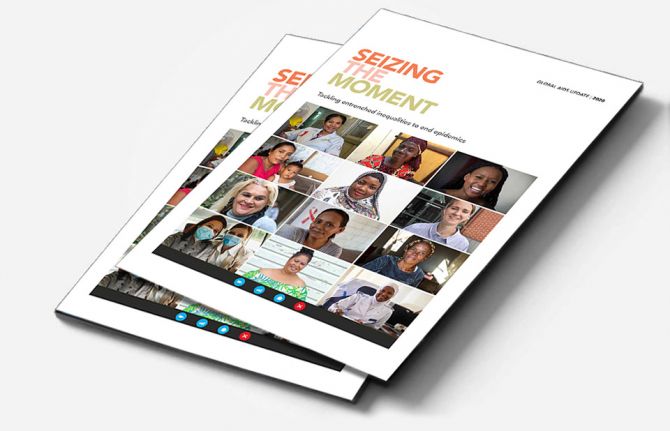
Press Release
UNAIDS report on the global AIDS epidemic shows that 2020 targets will not be met because of deeply unequal success; COVID-19 risks blowing HIV progress way off course
06 July 2020 06 July 2020Missed targets have resulted in 3.5 million more HIV infections and 820 000 more AIDS-related deaths since 2015 than if the world was on track to meet the 2020 targets. In addition, the response could be set back further, by 10 years or more, if the COVID-19 pandemic results in severe disruptions to HIV services.
GENEVA, 6 July 2020—A new report by UNAIDS shows remarkable, but highly unequal, progress, notably in expanding access to antiretroviral therapy. Because the achievements have not been shared equally within and between countries, the global HIV targets set for 2020 will not be reached. The report, Seizing the moment, warns that even the gains made could be lost and progress further stalled if we fail to act. It highlights just how urgent it is for countries to double down and act with greater urgency to reach the millions still left behind.
“Every day in the next decade decisive action is needed to get the world back on track to end the AIDS epidemic by 2030,” said Winnie Byanyima, the Executive Director of UNAIDS. “Millions of lives have been saved, particularly the lives of women in Africa. The progress made by many needs to be shared by all communities in all countries. Stigma and discrimination and widespread inequalities are major barriers to ending AIDS. Countries need to listen to the evidence and step up to their human rights responsibilities.”
Fourteen countries have achieved the 90–90–90 HIV treatment targets (90% of people living with HIV know their HIV status, of whom 90% are on antiretroviral treatment and of whom 90% are virally supressed), including Eswatini, which has one of the highest HIV prevalence rates in the world, at 27% in 2019, and which has now surpassed the targets to achieve 95–95–95.
Millions of lives and new infections have been saved by the scale-up of antiretroviral therapy. However, 690 000 people died of AIDS-related illnesses last year and 12.6 million of the 38 million people living with HIV were not accessing the life-saving treatment.
“We cannot rest on our successes, nor be discouraged by setbacks. We must ensure that no one is left behind. We must close the gaps. We are aiming for 100–100–100,” said Ambrose Dlamini, the Prime Minister of Eswatini.
The world is far behind in preventing new HIV infections. Some 1.7 million people were newly infected with the virus, more than three times the global target. There has been progress in eastern and southern Africa, where new HIV infections have reduced by 38% since 2010. This is in stark contrast to eastern Europe and central Asia, which has seen a staggering 72% rise in new HIV infections since 2010. New HIV infections have also risen in the Middle East and North Africa, by 22%, and by 21% in Latin America.
Seizing the moment shows unequal progress, with too many vulnerable people and populations left behind. Around 62% of new HIV infections occurred among key populations and their sexual partners, including gay men and other men who have sex with men, sex workers, people who inject drugs and people in prison, despite them constituting a very small proportion of the general population.
Stigma and discrimination, together with other social inequalities and exclusion, are proving to be key barriers. Marginalized populations who fear judgement, violence or arrest struggle to access sexual and reproductive health services, especially those related to contraception and HIV prevention. Stigma against people living with HIV is still commonplace. At least 82 countries criminalize some form of HIV transmission, exposure or non-disclosure, sex work is criminalized in at least 103 countries and at least 108 countries criminalize the consumption or possession of drugs for personal use.
Women and girls in sub-Saharan Africa continue to be the most affected and accounted for 59% of all new HIV infections in the region in 2019, with 4500 adolescent girls and young women between 15 and 24 years old becoming infected with HIV every week. Young women accounted for 24% of new HIV infections in 2019, despite making up only 10% of the population in sub-Saharan Africa.
However, where HIV services are comprehensively provided, HIV transmission levels are reduced significantly. In Eswatini, Lesotho and South Africa, a high coverage of combination prevention options, including social and economic support for young women and high levels of treatment coverage and viral suppression for previously unreached populations, have narrowed inequality gaps and driven down the incidence of new HIV infections.
The COVID-19 pandemic has seriously impacted the AIDS response and could disrupt it more. A six-month complete disruption in HIV treatment could cause more than 500 000 additional deaths in sub-Saharan Africa over the next year (2020–2021), bringing the region back to 2008 AIDS mortality levels. Even a 20% disruption could cause an additional 110 000 deaths.
“Those of us who survived HIV and fought for life and access to treatment and care cannot afford losing the gains that took so much effort to win. In some Latin American countries we are seeing how HIV resources, medicines, medical staff and equipment are being moved to the fight against COVID-19,” said Gracia Violeta Ross, President of the Bolivian Network of People Living with HIV. “Some good lessons and practices of the HIV response, such as meaningful participation and accountability, are being ignored. We will not allow HIV to be left behind.”
To fight the colliding epidemics of HIV and COVID-19, UNAIDS and partners are leading a global call for a People’s Vaccine for COVID-19, which has been signed by more than 150 world leaders and experts demanding that all vaccines, treatments and tests be patent-free, mass produced and distributed fairly and free for all.
UNAIDS is also urging countries to increase investments in both diseases. In 2019, funding for HIV fell by 7% from 2017, to US$ 18.6 billion. This setback means that funding is 30% short of the US$ 26.2 billion needed to effectively respond to HIV in 2020.
“We cannot have poor countries at the back of the queue. It should not depend on the money in your pocket or the colour of your skin to be protected against these deadly viruses,” said Ms Byanyima. “We cannot take money from one disease to treat another. Both HIV and COVID-19 must be fully funded if we are to avoid massive loss of life.”
UNAIDS
The Joint United Nations Programme on HIV/AIDS (UNAIDS) leads and inspires the world to achieve its shared vision of zero new HIV infections, zero discrimination and zero AIDS-related deaths. UNAIDS unites the efforts of 11 UN organizations—UNHCR, UNICEF, WFP, UNDP, UNFPA, UNODC, UN Women, ILO, UNESCO, WHO and the World Bank—and works closely with global and national partners towards ending the AIDS epidemic by 2030 as part of the Sustainable Development Goals. Learn more at unaids.org and connect with us on Facebook, Twitter, Instagram and YouTube.
Contact
UNAIDS GenevaSophie Barton-Knott
tel. +41 22 791 1697 / +41 79 514 6896
bartonknotts@unaids.org
UNAIDS Media
tel. +41 22 791 4237
communications@unaids.org
Press centre
Download the printable version (PDF)

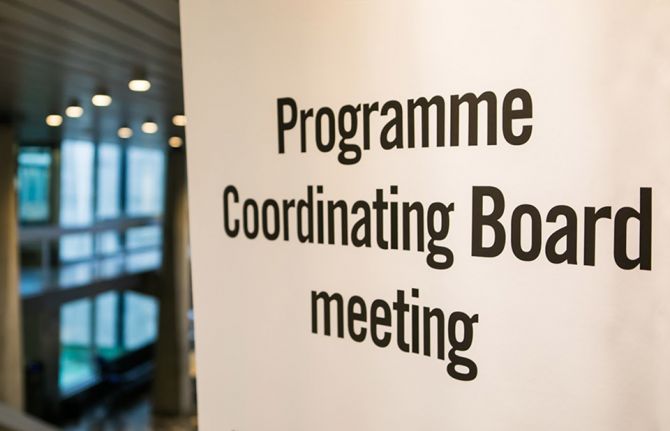
Press Release
UNAIDS Board discusses UNAIDS’ work on COVID-19 and HIV and UNAIDS’ next strategy and its transformative agenda
26 June 2020 26 June 2020GENEVA, 26 June 2020—The 46th meeting of the UNAIDS Programme Coordinating Board (PCB) has concluded in Geneva, Switzerland. The PCB, which met from 23 to 25 June 2020, was held for the very first time as a virtual meeting because of the COVID-19 pandemic. The PCB, chaired by the United States of America, had decided that it would be important to demonstrate that the intergovernmental process can continue to work effectively during the COVID-19 pandemic.
During the meeting, a series of crucial decisions were taken on the future of the HIV response and on the transformation of UNAIDS, while the interconnectedness between the twin pandemics of HIV and COVID-19 was discussed and reflected upon.
“I thank the Programme Coordinating Board for the trust it has given us to take forward our ambitious agenda,” said Winnie Byanyima, Executive Director of UNAIDS. “I am excited that further work towards a new global HIV strategy for an HIV response that incorporates the COVID-19 and post-COVID-19 realities, and for a fitter and more responsive UNAIDS, has been given the green light. I’m looking forward to putting this work into action.”
The three-day meeting opened with an overview given by Ms Byanyima on the HIV/COVID-19 landscape in mid-2020, which stressed that the HIV epidemic is urgent and very much unfinished business and that the world is off course to meet the 2020 HIV targets. She urged countries to leverage the decades of investment in the HIV response and to learn the lessons from a history of unequal access to HIV services and apply them to the fight against COVID-19, including by supporting a People’s Vaccine.
The critical nature of the next UNAIDS strategy—a strategy that it was acknowledged must be ambitious, visionary, data-driven, evidence-informed, well resourced and well received—was discussed by the participants. The PCB laid out a timeline of milestones for the development of the bold new strategy and decided that UNAIDS would present a report on the outcome of the ongoing review and consultations on the strategy for approval by the end of October 2020. A draft of the strategy will be discussed at the next PCB meeting, in December 2020.
The PCB also debated the transformation of UNAIDS. The PCB heard an update on the implementation of the Management Action Plan, which was set up to ensure a healthy, equitable and enabling workplace for all UNAIDS staff. It welcomed the progress made so far and called for faster progress, particularly on strengthening systems of internal justice and redress. The PCB working group on the recommendations of the Joint Inspection Unit (JIU) also gave an update on its work to ensure that the JIU’s recommendations are acted upon.
When discussing the UNAIDS Unified Budget, Results and Accountability Framework, the PCB recognized that UNAIDS delivers on its core mandate, leads in reaching the people who are being left the furthest behind and targets inequalities. UNAIDS’ strengthened work at the country level was welcomed.
Reports on performance monitoring of UNAIDS, UNAIDS’ finances and strategic human resources management issues were examined at the meeting. The PCB welcomed the reported accomplishments of the Joint Programme in strengthening joint and collaborative action at the country level but expressed concern about the forecast US$ 15 million shortfall against the core budget. The announcement by the Government of Germany that it had contributed a further €20 million to UNAIDS in 2020 was welcomed, however. The PCB also welcomed that the reports of the external and internal auditors were discussed in a distinct agenda item, where PCB members engaged with the auditors.
The planned thematic segment on cervical cancer that was due to be held on 25 June will now be held during the December PCB meeting.
Representatives of United Nations Member States, international organizations, civil society and nongovernmental organizations attended the three-day meeting, which was chaired by the United States of America, with Namibia serving as Vice-Chair and India as Rapporteur.
The report to the Board by the UNAIDS Executive Director and the PCB’s decisions can be found at https://www.unaids.org/en/whoweare/pcb/46.
UNAIDS
The Joint United Nations Programme on HIV/AIDS (UNAIDS) leads and inspires the world to achieve its shared vision of zero new HIV infections, zero discrimination and zero AIDS-related deaths. UNAIDS unites the efforts of 11 UN organizations—UNHCR, UNICEF, WFP, UNDP, UNFPA, UNODC, UN Women, ILO, UNESCO, WHO and the World Bank—and works closely with global and national partners towards ending the AIDS epidemic by 2030 as part of the Sustainable Development Goals. Learn more at unaids.org and connect with us on Facebook, Twitter, Instagram and YouTube.
Contact
UNAIDS GenevaSophie Barton-Knott
tel. +41 79 514 68 96
bartonknotts@unaids.org
UNAIDS Media
tel. +41 22 791 4237
communications@unaids.org
Press centre
Download the printable version (PDF)

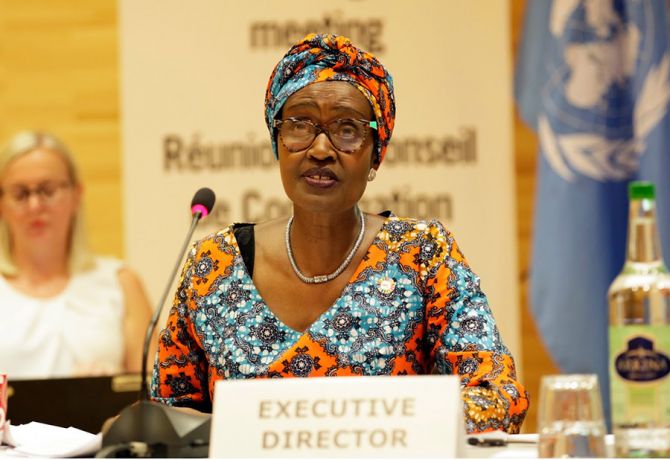
Press Release
UNAIDS Executive Director sets out HIV/COVID-19 landscape at opening of PCB meeting
24 June 2020 24 June 2020GENEVA, 24 June 2020—The 46th meeting of the UNAIDS Programme Coordinating Board commenced on 23 June 2020. Held for the first time as a virtual meeting, as a result of the COVID-19 pandemic, the meeting will see three days of discussion and reflection on the HIV response, the interconnectedness between the twin pandemics of HIV and COVID-19 and the work of the Secretariat and the Joint Programme.
In her opening address to the PCB meeting, Winnie Byanyima, the Executive Director of UNAIDS, presented an overview of the HIV/COVID-19 landscape in mid-2020 and told the online audience that the HIV epidemic is still urgent, unfinished business.
“Even before COVID-19 we were not on track to meet our targets for 2020. Now the COVID-19 crisis risks blowing us way off course,” warned Ms Byanyima. “As a Joint Programme, we must address the deeper challenges to recover from this crisis to beat both pandemics and foster safe, equitable and resilient societies,” she added.
Ms Byanyima urged countries to learn the lessons from a history of unequal access to HIV services and apply them to the fight against COVID-19. She noted that millions of people died from AIDS-related illnesses while there were medicines available that could have saved their lives—leaving access to medicines to pharmaceutical companies resulted in prices that were too high for people in developing countries.
In the same vein, Ms Byanyima reiterated her call for a People’s Vaccine for COVID-19, with an international agreement that any vaccines and treatments discovered for COVID-19 be made available to all countries. “Developing countries must not be priced out,” she said.
The Executive Director also spoke about the increasing relevance of UNAIDS during a new pandemic and how it has a unique combination of experience and expertise that can help ensure that investments in the COVID-19 response reflect the vital lessons learned from the HIV response.
Supporting HIV treatment and prevention, working on the front line with communities, supporting human rights and gender equality and campaigning against stigma and discrimination—these are part of UNAIDS’ core mandate, she told the meeting. UNAIDS will continue to deliver on that mandate and reach the people who are left the furthest behind, but will also move the global policy needle and tackle the inequalities that place people at greater risk of both HIV and COVID-19, she said.
Turning to the next global UNAIDS strategy, Ms Byanyima committed that the critical new strategy, designed to shape an improved HIV response, will reflect the widest possible input and engagement—from the PCB, its constituencies and the global AIDS community. She suggested that an ambitious draft strategy be presented to the 47th meeting of the PCB in December 2020, with a final version to be reviewed and adopted by the PCB in March 2021.
Ms Byanyima updated the PCB on the internal transformation of UNAIDS, outlining how she will bring feminist leadership principles to help change the culture of the organization. A series of other steps—including a revised performance management system and an independent ethics function—that will ensure that the transformation continues to be on course were announced.
Ms Byanyima ended her address with a reminder of the huge returns that are seen from investing in UNAIDS. She said that it is vital that UNAIDS, along with funding sources such as the Global Fund to Fight AIDS, Tuberculosis and Malaria and the United States President’s Emergency Plan for AIDS Relief, be fully funded.
“As COVID-19 has shown, investments in HIV principles, approaches and infrastructure and expertise extend far beyond the AIDS response,” she said.
UNAIDS
The Joint United Nations Programme on HIV/AIDS (UNAIDS) leads and inspires the world to achieve its shared vision of zero new HIV infections, zero discrimination and zero AIDS-related deaths. UNAIDS unites the efforts of 11 UN organizations—UNHCR, UNICEF, WFP, UNDP, UNFPA, UNODC, UN Women, ILO, UNESCO, WHO and the World Bank—and works closely with global and national partners towards ending the AIDS epidemic by 2030 as part of the Sustainable Development Goals. Learn more at unaids.org and connect with us on Facebook, Twitter, Instagram and YouTube.
Contact
UNAIDS GenevaSophie Barton-Knott
tel. +41 79 514 68 96
bartonknotts@unaids.org
UNAIDS Media
tel. +41 22 791 4237
communications@unaids.org
Press centre
Download the printable version (PDF)
